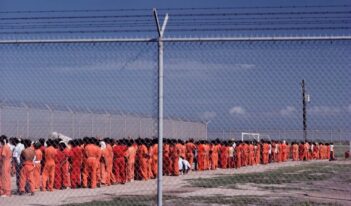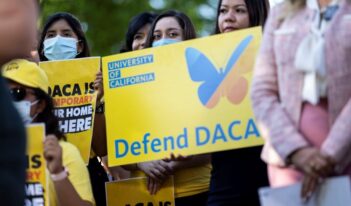
The U.S. Department of State seeks to increase wages and improve labor protections for au pairs.
Are au pairs cultural ambassadors in the United States or vulnerable low-wage workers requiring robust labor protections?
It depends on who you ask.
Proponents of the U.S Department of State’s au pair program argue that the program—one of over a dozen J-1 visa schemes governed by the State Department’s Exchange Visitor Program—should be considered a “public diplomacy tool” and an opportunity for young foreign nationals to learn about American life by studying and working as live-in childcare providers to U.S. host families. By contrast, many labor experts argue that the program is an unregulated low-wage work scheme cloaked in the false promise of cultural exchange.
The State Department proposed a rule recently that would clarify the au pair program’s educational and cultural exchange goals by increasing education stipends, proposing new requirements to strengthen au pair protections, and offering a “part-time” program that limits childcare duties to 24 to 31 hours per week, among other changes.
To compensate au pairs more fairly, the State Department proposed a national, tiered wage formula to promote wage consistency “across geographic regions and in areas with similar local economic conditions.”
In addition, the State Department claims that the proposed rule would provide au pairs with labor protections similar to those that U.S. workers enjoy. For example, the proposed rule would require host families to pay overtime premiums if their au pairs worked over 40 hours in a week.
Many labor advocates have long opposed the au pair program. These critics warn that the program displaces U.S. workers because host families view au pairs as “cheaper nannies.” In addition, they contend that the State Department is “wholly unqualified” to address abuses that au pairs sometimes face. Unlike certain foreign labor programs, the au pair program operates without U.S. Department of Labor oversight or certification.
Instead of experiencing cultural immersion, many former program participants report abuse and labor exploitation. Some former au pairs have accused their host families of denying them food, invading their privacy, and stealing their wages; when some filed complaints with the State Department, their host families retaliated by facilitating their deportations.
Some journalists who have reported on the program’s shortcomings conclude that its problems may lie in au pairs’ and host families’ divergent expectations. They note that private sponsorship agencies sell the program to foreigners as a cultural experience but to families as a cheap labor source.
Despite the program’s need for reform, the proposed rule received comments from stakeholders concerned that the proposed changes would make childcare less affordable or undermine the immersion of au pairs into their host families’ lives.
Indeed, economic researchers found that a 2019 federal court ruling in Massachusetts establishing minimum wage requirements for au pairs may have reduced program hiring in the state. These researchers expressed concern that the Biden Administration’s proposed rule could have a similar effect nationwide.
The State Department will accept comments on the proposed rule until January 28, 2024.
In this week’s Saturday Seminar, scholars examine challenges surrounding the au pair program and J-1 visa schemes more generally and provide recommendations to improve them.
- The Cato Institute’s Alex Nowrasteh argues in a public comment that the proposed changes to the au pair program are too complex and burdensome for host families and private sponsorship agencies. Nowrasteh notes that although the proposed rule raises the au pair minimum wage to address increased living costs, it fails to raise the amount host families can deduct from their au pairs’ wages for lodging and meals. Nowrasteh recommends that the U.S. Office of Information and Regulatory Affairs reassess the proposed rule’s cost, suggesting that the proposed changes may actually decrease au pair program participation rates.
- In written testimony prepared for the U.S. Senate Committee on the Judiciary, the Economic Policy Institute’s Daniel Costa characterizes the au pair program and certain other temporary work schemes as “de facto low-wage work visa programs.” He criticizes these schemes because they fail to raise wages and reduce poverty. Costa suggests that the U.S. Congress reform temporary work visa programs to align them with “basic human and labor rights.” For example, Costa urges Congress to require these programs to pay the prevailing wage. He also advocates establishing laws against tying temporary workers’ visa statuses to their employers—changes that could better protect them against employer retaliation and deportation.
- In an article for the Yale Journal of Law and Feminism, Shayak Sarkar of UC Davis School of Law details how au pairs use antitrust and state labor laws to secure employment protections. Sarkar explains that the U.S. government often characterizes au pairs as “emissaries” or members of their host families. He argues that policymakers prioritize host families’ desires for cheap childcare over au pairs’ rights. Sarkar notes, however, that au pairs have sometimes secured labor rights in federal courts successfully. In Beltran v. InterExchange, Inc., for example, a federal court in Colorado permitted a class of au pairs to access state wage and hour protections and determined that private sponsorship agencies engaged in anticompetitive actions.
- Anti-human trafficking organization Polaris summarizes data gathered from its National Human Trafficking Hotline in a recent report on the labor trafficking of J-1 workers and other temporary visa holders. Polaris identifies nearly 200 J-1 visa holders as labor trafficking victims. In its analysis of Hotline calls, Polaris finds that 60 percent of labor trafficking victims on J-1 visas reported working “excessive hours,” 45 percent reported receiving inaccurate or incomplete information about their work responsibilities from recruiters, and nearly 30 percent said that employers threatened them with deportation.
- In the NYU Review of Law & Social Change, former National Domestic Workers Alliance legal fellow Miranda Mammen argues that the Fair Labor Standards Act creates “legal subminimum wages” for live-in domestic workers whose employers deduct meal and lodging costs from their take-home pay. Mammen finds that the average live-in domestic worker earns less per hour than the federal minimum wage. Mammen observes that although the Fair Labor Standards Act permits meal and lodging wage deductions, such deductions compound existing challenges for live-in domestic workers. For example, Mammen notes that these workers lack privacy from their employers and control over their living arrangements, and they often face housing insecurity if their employment is terminated.
- In the Lewis & Clark Law Review, Victoria Bejarano Muirhead, formerly of Lewis & Clark Law School, argues that exploitation is a “feature” of the au pair program, “not an accident.” Muirhead suggests that the State Department should partner with Congress and the Labor Department to collect, investigate, and resolve complaints from au pairs to improve program oversight. In addition, because an au pair’s live-in status creates a flexible childcare arrangement that benefits host families, Muirhead recommends that the State Department prohibit families from deducting room and board costs from program participants’ wages if they are not for the “primary benefit” of the au pair.
The Saturday Seminar is a weekly feature that aims to put into written form the kind of content that would be conveyed in a live seminar involving regulatory experts. Each week, The Regulatory Review publishes a brief overview of a selected regulatory topic and then distills recent research and scholarly writing on that topic.



